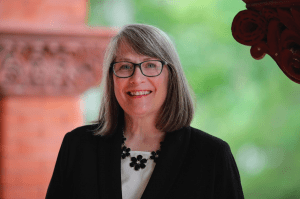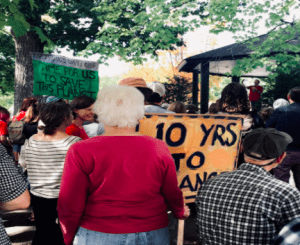
Sep 26, 2019 | News |
Jocea Jordan, Contributing Writer
After Title IX issues relating to sexual misconduct occurred across the UMF campus last year and were publicized by Bangor Daily News, changes are being made to safety procedures and policies.
Title IX is a federal civil rights law that prohibits discrimination on the basis of sex in education programs and activities. Under Title IX, discrimination on the basis of sex includes pregnancy discrimination, sexual harassment or sexual violence, such as sexual assault and sexual coercion.
Hope Shore, the Title IX Deputy Coordinator, commented on safety improvements in an email interview. “For my specific area, we are making sure that information about resources, where to report and information about procedures is more visible on campus. Bystander intervention training is being offered frequently on campus with student leaders such as CAs and Orientation Leaders.”
Hope also said, “We are continuing to have good dialogue with faculty, staff and students to make sure everyone is informed on how to report, who to report to, how our process works and information about resources. We will continue to have programs, trainings and events related to prevention, education and information around the areas of Title IX.”

Katerina Burns (left) and Eila McCulloch (right), co-presidents of LUITE, are major contributors toward recent growth in safety at UMF
The Campus Police department has recently made some changes to their staff, ensuring that there was a Sergeant accessible for at least 12 hours a day, seven days a week. There are now two Sergeants who work for Campus police and they have a rotating schedule, switching off every weekend.
Sergeant Wayne Drake said, “We restructured the department in such a way that we could hire another sergeant, so I am the Assistant Director of Public Safety and then what we did was hire Marc Bowering, who spent twenty years as the detective in Farmington and recently retired.” The Campus Police department is also the only department that is open seven days a week, 365 days a year.
“Having two sergeants has enabled us to have more continuity, a more consistent response. . . the call boxes have been fixed, the security escorts have been doing their training this week. . . it’s going to be fully staffed and we are running Sunday night through Thursday night to cover all of the classes,” said Drake. The escort program provides students with trained escorts to walk them from any place on campus back to their dorms or other buildings to ensure that they get back safely.
Eila McCulloch, a UMF student and co-president of Look Us In The Eyes (LUITE), a student advocacy group which formed last year in the wake of the BDN articles, noted specific changes she hopes to see in the future to improve the safety of students in messages sent to the Flyer.
“Better lighting, as was discussed last semester, would help prevent a lot of incidents and would help students feel safer at night,” McCulloch said. “Last semester a sexual health course and self defense training classes were offered as ideas and the school seemed to be on board. However, the health course never launched and the self defense class was a two-session course on a Friday night which is an incredibly inconvenient time for many people,” said McCulloch.
The sexual health course in question was proposed last spring by students and was designed to focus on sexual consent, wellness, and healthy relationships. According to community health professor Dr. Kelly Bentley, in comments posted on the LUITE Facebook page, “. . .the courses did not fill. So, the committee will reconvene. Stay tuned!” In another comment she also noted, “[The class] was planned as a pilot. New courses always have lots of planning details to figure out. I believe advocacy is important as it will take a while to figure out the kinks.”
Katerina Burns, who is also the co-president of LUITE, said in messages sent to the Flyer, “ I’m really glad that the University is standing by its position and supporting survivors. . .I am glad that UMF continues to listen, support and provide a sense of affirmation.”
Burns believes that support in the UMF community is vital to helping the campus to become a safer place. “My hope is that President Serna and the school will continue to work with SAPARS and LUITE to make our campus as safe as it can be. A big step in doing that would be getting the [sexual health] class reinstated. Our former group president Amy Fortier-Brown had pushed very hard to have a physical health class that would include topics like consent, healthy relationships and safe sex. I think that would be incredibly useful, especially given the recent Title IX controversies at our school,” said Burns.

Sep 26, 2019 | Feature |
Nathan McIvor, Vice President
Dr. Christine Wilson, UMF’s new Vice President for Student Affairs, looks forward to making sure the university is more responsive to its students’ needs, especially in the wake of the recent LEAP building explosion on September 16th which displaced students after their homes were destroyed. Wilson, whose duties include coordinating communications, hopes to develop additional measures to enhance communication between students and the administration.
“I’d like to have dinner with a different group of students every month, and have them ask me what they want to know. They can talk about whatever they would like and ask me questions,” Wilson said. Afterwards, she plans to conduct the necessary research to address students’ needs.

Dr. Christine Wilson is ready to build a strong relationship with UMF students, faculty, and the Farmington community.
Wilson would also like to establish an online assessment site where students can share their thoughts about particular aspects of the UMF experience. “I want to share the assessment results with students regularly, so that students know that we’ve heard from them,” she said. Students would see results, thus resulting in a hopefully open, ongoing dialogue regarding how well the school is addressing the needs of its students.
An administrator with over thirty years of experience in higher education, she draws from her background in restorative practices, volunteerism and teaching to inform her management style. In her new role she oversees Student Life (which includes Residential Life), athletics, recreation, UMF Campus Police, the Center for Student Development, Student Health, the Deputy Title IX Coordinator, and student leadership and service.
She focuses on her relationships with students, faculty and staff and “[makes] sure that procedures and infrastructure are solid.” The ultimate goal is “to make sure that students have a positive experience, that they’re safe, that their needs are met, so they can succeed academically, graduate and go on to make positive impacts in their careers and in their communities,” Wilson said.
She highlighted an early experiences with volunteerism after college which inspired her to work in higher education. “I spent a year as a VISTA [Americorp volunteer], during which I volunteered to set up adult reading programs. I recruited adults who didn’t know how to read or to speak English and I would recruit and train tutors to help them,” she said.
“It was probably the most important year of my career. . . these adults who didn’t know how to read, had nothing inherently wrong with them, it was just that our systems had failed them. I decided that I was going to go back to school so I could help prepare people who are going to be leaders to be effective and inclusive leaders. And I’ve been working with students ever since.”
An avid outdoorswoman, Dr. Wilson was excited by the natural beauty of Farmington when she drove to campus for her job interview. She enjoys kayaking and hiking, “so this is the perfect place for me,” she said. She also “loves to scrapbook,” and can be found attending scrapbooking retreats throughout the year. Before coming to UMF, she served as Assistant Vice President for Student Affairs at the University of Connecticut. She lives in Farmington with her partner Patrick and their dogs Bastille and Bergeron.

Sep 26, 2019 | News |
Ciera Miller, Contributing Writer
Protesters for the Global Climate Strike took to the streets in cities all over the world at noon on Friday, Sept. 20, the people of Farmington marching among them. On the Mantor Green, students, professors and community members assembled just beside the bustling Club Fair with the intent to march through the Farmington area for the climate strike.

Strikers gathered outside the gazebo as part of their march through downtown Farmington.
The strikers were poised to raise awareness for the crisis that is global warming. The heart of the problem is the significantly increased rate at which greenhouse gases, such as carbon dioxide and methane, are released into the atmosphere by human activity and causing Earth’s rapid heating.
The Intergovernmental Panel for Climate Change (ICPP) created by the United Nations has found that global warming is a real threat to the world and human life, and that it is being accelerated by humans.
The strikers believe the planet’s warming can be slowed by a collective effort among all people and institutions to make large moves in reducing harm to the environment. As one of the last speakers said at the strike, “If we all work together and do big things, we can make big changes.”
The marchers began their climate strike on the green itself. They walked around one side of the Club Fair and then stopped beside the art gallery. Here, people put on headpieces made to look like elephants, reindeer, and other animals. A person in the mix shouted, “Are we ready to march for our current climate situation?” The strikers responded with a loud “Yes!” The attention of club members and fairgoers had been grabbed. They watched as the group raised their signs and moved forward toward Main St.
They marched down Main until they reached the gazebo across from the courthouse in downtown Farmington. Along the way, other strikers joined in and the line stretched fifty feet down the sidewalk. Passing drivers honked their horns and waved at the procession. At the gazebo, people of all ages had already gathered: there were elementary school children standing with their parents, middle and high schoolers, members of the UMF community and other residents of Farmington.

Éireann Lorsung, a professor in the English department at UMF, stands with her sign as part of the Global Climate Strike.
In their hands were their own signs: “10 Yrs to Change” on one lady’s fiery orange poster, “The Thermometer is Neither Conservative nor Liberal” on another. Professor Éireann Lorsung of the English department hoisted a sign displaying a modified line from Shakespeare, “Shall I compare thee to an unlive-ably hot summer’s day?. . .No planet, no poetry.” Her sign included the fact that July 2019 was about 1.2℃ (34.16℉) warmer than the pre-Industrial era.
As the protest gained attention, some ideological contentions arose when onlookers voiced differing opinions from those of the protesters. A group of motorcyclists drove by while a UMF student spoke and one of riders yelled, “Why don’t you run for president?” “Go Trump!” was yelled by some passing motorists as they revved their engines.
However, some commuters slowed to read each of the signs or gawk at the person in the fish headpiece who stood by the side of the road. A firefighter in his truck had asked a few questions about the strike while waiting for the stoplight to turn green.
Sep 26, 2019 | Sports |
Krystin Paine, Contributing Writer
Men’s rugby at UMF has been gaining more attention lately as the team has proven to be a competitive force with multiple championship wins in recent years. The team holds high hopes for the upcoming season despite the loss of some talented players.
Jack Neary, a senior, is optimistic about how the current team is shaping up. “We have definitely lost a good amount of talent on the team in the last year, but we have players who are stepping up and filling those roles,” he said. “That’s the great part about the sport, when you lose a senior, a new player has something to prove in the upcoming season.”
The club started in 1991 with only about 15 people. Since then, the men’s rugby team has been the Maine Cup Champs in 2011, 2013 and 2014, won the New England Rugby Football Union Championship for the past two years, and had undefeated seasons in 2017 and 2018. This year’s team is trying to repeat all of these successes and more.
Neary is preparing for his last year as a UMF rugby player after returning to the team for the past five years. He talked about how the team has affected him and changed his life for the better. “It’s had a positive impact in the sense that it’s introduced me to a sport I knew virtually nothing about when I started. I really enjoy playing it and I want to attempt to play when I’m finished here at UMF,” he said. “I think my impact on the team has been pretty minimal in the sense that I am a small piece of a large puzzle.”
He says the team is also working on chemistry between players by making sure the new members, “feel comfortable working with some of the veteran and returning players.”
Sam Urszinyi, a sophmore, played last spring and is returning for his first fall semester with the team, has some things to say about veterans helping newer players. “They try to make sure that you understand positioning a lot in games and practices,” he said. “They try to tell us to focus on the basics in a Bill Belicheck, ‘do your job,’ environment and increasing defensiveness and ball security. I’ve been watching a lot more rugby which I’m hoping will aid in my game sense.” He also said that rugby has taught him better time management and commitment.
Another player, Davion Jackson, returning for his second year, said that the team plans “on repeating the [winning] streak this year by continuing to practice hard and keep everyone healthy every game.”
Jackson also said he found a support system in the team during his time as a player. “Honestly, the rugby team has had a big effect on me throughout my first year of college here at UMF. It’s helped me through some pretty tough times and the camaraderie just made me feel more like I belonged here considering there aren’t that many people who look like me around here.”
Like Neary, Jackson is also hopeful for how the new players can make up for what the team has lost. “As of now, we have a lot of new guys who are ambitious to play the game, but aren’t really knowledgeable on the game quite yet,” he said, “but the chemistry and willingness to learn more is there.”
The opening game of the season is on Sept. 28 at 11 a.m. They will be playing against the University of Maine on UMF’s Prescott field. The game is open to the public with free admission. For more information, contact Erin Buckland or Kristen Swan.
Sep 26, 2019 | News |
Derek Taber, Contributing Writer
The Hotel Rumford in Rumford, ME is celebrating its 130-year anniversary and UMF alumni Melissa Carrier is at the helm of a growing economy for this small mountain town.
Carrier, who graduated from UMF in 2009, has owned and operated the historic hotel and bar with her husband, Brian, for the last year and a half. Carrier is changing the vision and atmosphere of the staple establishment, and leading the charge of a growing economy. Once considered a dying mill town, Rumford has seen lowered unemployment, and a rejuvenated workforce, allowing room for growth and opportunity in the emboldened community.
George O’Keefe, the director of economic development for the town of Rumford, was hired to stimulate business growth and inject new ideas for downtown businesses to reinvigorate that Rumford has ample room to thrive and succeed. “It’s very positive to see young people staying in town, and running a business,” O’Keefe says.
The Hotel Rumford has been one of the few businesses to survive the economic downturn of the last quarter century. A shrinking logging and paper industry has been the main culprit for the lost jobs in the area. At one point there were six paper machines operating, with over 1000 blue collar jobs available. When the mill struggles, “Everyone panics,” Carrier says.
The Hotel Rumford was a haven for loggers and paper workers, allowing a place for respite, and lift of spirit from the grueling work in the woods. “This is the heart of downtown Rumford,” says O’Keefe. The town rallies around the business and frequents the establishment often.
The hotel also brings in people from out of town who come to work on shutdowns and construction projects associated with the mill.
Carrier started her business education in her sophomore year of college. She worked in the community at the Granary Restaurant and Pub in Farmington, and summers at the Kawanhee Inn in Weld. Carrier and the future head chef of the Hotel Rumford, Scott Croteau, met when Carrier was a dishwasher at Kawanhee. “Scott is an amazing chef,” Carrier said.
Croteau prides himself on delivering a fresh menu with local ingredients. “He makes almost everything in house,” Carrier laments.
The Hotel Rumford has 12 employees that work at the restaurant. The economic outreach that comes from the employment is deep. “Everyone seems to know your name when you walk in to the bar,” O’Keefe says.
The Carriers recently did some remodeling to the hotel and restaurant to bring back the staple theme of logging to the town. They decorated the restaurant with antique saws and pictures from the town when horses and carriages roamed the streets.
The difference from now and 130 years ago is substantial. Recreation and vacation destinations rival the paper industry as the main catalyst for economic growth. The potential is prevalent. If people have a place to call home when they are in town, the sentiments will only grow stronger, and the future is vibrant.




